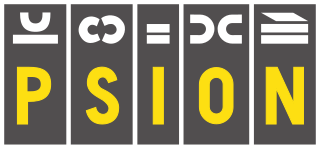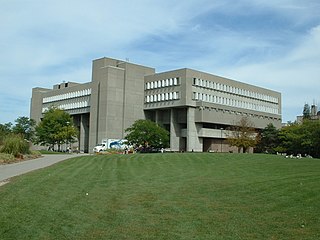Related Research Articles

Psion PLC was a designer and manufacturer of mobile handheld computers for commercial and industrial uses. The company was headquartered in London, England, with major operations in Mississauga, Ontario, Canada, and other company offices in Europe, the United States, Asia, Latin America, and the Middle East. It was a public company listed on the London Stock Exchange and was once a constituent of the FTSE 100 Index.

The University of Waterloo is a public research university with a main campus in Waterloo, Ontario, Canada. The main campus is on 404 hectares of land adjacent to uptown Waterloo and Waterloo Park. The university also operates three satellite campuses and four affiliated university colleges. The university offers academic programs administered by six faculties and thirteen faculty-based schools. Waterloo operates the largest post-secondary co-operative education program in the world, with over 20,000 undergraduate students enrolled in the university's co-op program. Waterloo is a member of the U15, a group of research-intensive universities in Canada.

École de technologie supérieure (ÉTS), founded in 1974, is a public research university in Montreal, Quebec, Canada and affiliated to the Université du Québec system. The school specializes in applied teaching and research in engineering as well as transferring advanced technologies to companies.

The Faculty of Applied Science and Engineering is the engineering school of the University of Toronto, a public research university in Toronto, Ontario, Canada. It was founded in 1873 and currently is housed in 15 facilities on the southern side of St. George Campus and 3 building located across downtown Toronto. The faculty offers undergraduate, master's, and doctoral degrees in engineering sciences and has a partnership with the Rotman School of Management for a dual-degree program.
Georgian College is a College of Applied Arts and Technology in Ontario, Canada, partnered with ILAC International College. It has 13,000 full-time students, including 4,500 international students from 85 countries, across seven campuses, the largest being in Barrie.

Ferranti-Packard Ltd. was the Canadian division of Ferranti's global manufacturing empire, formed by the 1958 merger of Ferranti Electric and Packard Electric. For several years in the post-war era, the company underwent a dramatic expansion and had several brushes with success in the computer market, but eventually shed various divisions and returned to being an electrical grid supplier once again. The company was purchased in 1998 by the Austrian company, VA TECH. On July 23, 2005 Siemens PTD purchased VA Tech's Transmission and Distribution Division (T&D) group for transformers and switchgear.
The FP-6000 was a second-generation mainframe computer developed and built by Ferranti-Packard, the Canadian division of Ferranti, in the early 1960s. It is particularly notable for supporting multitasking, being one of the first commercial machines to do so. Only six FP-6000s were sold before the computer division of Ferranti-Packard was sold off by Ferranti's UK headquarters in 1963, the FP-6000 becoming the basis for the mid-range machines of the ICT 1900, which sold into the thousands in Europe.

Adel S. Sedra is an Egyptian Canadian electrical engineer and professor.
The David R. Cheriton School of Computer Science is a professional school within the Faculty of Mathematics at the University of Waterloo. QS World University Rankings ranked the David R. Cheriton School of Computer Science 21st in the world, 10th in North America and 2nd in Canada in Computer Science in 2024. U.S. News & World Report ranked the David R. Cheriton School of Computer Science 42nd in world and second in Canada.

The Faculty of Mathematics is one of six faculties of the University of Waterloo in Waterloo, Ontario, offering more than 500 courses in mathematics, statistics and computer science. The faculty also houses the David R. Cheriton School of Computer Science, formerly the faculty's computer science department. There are more than 31,000 alumni.

The University of Pennsylvania School of Engineering and Applied Science is the undergraduate and graduate engineering school of the University of Pennsylvania, a private research university in Philadelphia. The school offers programs that emphasize hands-on study of engineering fundamentals while encouraging students to leverage the educational offerings of the broader University. Engineering students can also take advantage of research opportunities through interactions with Penn’s School of Medicine, School of Arts and Sciences, and the Wharton School.
Psion Teklogix Inc. was the operational business of Psion.
Teklogix International Inc., or Teklogix, was a tech company founded in 1967 by engineers working at Ferranti-Packard. The company focused on mini computer applications. It designed and built complete systems based upon DEC's PDP-8 computer, DEC's logic modules and purpose built logic. Many of the company's projects involved control of material handling systems and this led to the development of radio linked terminals for installation on fork lift trucks complete with multiplexers to interface to a variety of main frame computer systems.
The Irwin and Joan Jacobs School of Engineering is an undergraduate and graduate-level engineering school offering BS, BA, MEng, MS, MAS and PhD degrees at the University of California, San Diego in San Diego, California. The Jacobs School of Engineering is the youngest engineering school of the nation's top ten, the largest by enrollment in the University of California system, as well as the largest engineering school on the West Coast and the ninth-largest in the country. More than thirty faculty have been named members of the National Academies. The current dean of the Jacobs School of Engineering is Albert P. Pisano.

The Faculty of Engineering is one of six faculties at the University of Waterloo in Waterloo, Ontario, Canada. It has 8,698 undergraduate students, 2176 graduate students, 334 faculty and 52,750 alumni making it the largest engineering school in Canada with external research funding from 195 Canadian and international partners exceeding $86.8 million. Ranked among the top 50 engineering schools in the world, the faculty of engineering houses eight academic units and offers 15 bachelor's degree programs in a variety of disciplines.

The Stratford School of Interaction Design and Business, also known as the University of Waterloo Stratford School and formerly the University of Waterloo Stratford Campus, is a satellite campus of the University of Waterloo located in Stratford, Ontario, Canada.
The University of Wisconsin–Milwaukee is a doctoral-degree granting public research university that consists of 14 colleges and schools, and 70 academic centers, institutes and laboratory facilities. It offers a total of 180 degree programs, including 94 bachelor's, 53 master's and 32 doctorate degrees. The School of Freshwater Sciences is the only graduate school of freshwater science in the U.S. and the third in the world. The School of Architecture and Urban Planning, the College of Nursing and the College of Health Sciences are the largest in Wisconsin.
Ryan Gariepy is a Canadian engineer, roboticist, and technology entrepreneur. He co-founded Clearpath Robotics with Matt Rendall, Bryan Webb, and Patrick Martinson in 2009, and subsidiary OTTO Motors in 2015. Gariepy currently serves as the Chief Technology Officer of both Clearpath Robotics and OTTO Motors, and as a founding board member of Open Robotics. He is named on over 40 patents and patents pending in the field of intelligent systems.
Mona Elwakkad Zaghloul is an Egyptian-American electronics engineer known for her work in integrated circuits, neural networks, and CMOS-based microelectromechanical systems. She is a professor of electrical and computer engineering in the George Washington University School of Engineering and Applied Science, where she directs the Institute of MEMS and VLSI Technologies.
References
- ↑ "Coutts graduated from Waterloo in 1964 with a bachelor of applied science degree in electrical engineering."
- ↑ Jim Fox, John Morris (2000-11-28). "Graduate Rod Coutts gives ... to UW". News Release. UW News Bureau. Retrieved 2009-02-08.
- ↑ "News".
- ↑ http://www.engineering.uwaterloo.ca/news/AnnualReport/engineering.html Waterloo Faculty of Engineering Annual Report 2007
- ↑ Vardalas, John N. (2001). The Computer Revolution in Canada: Building National Technological Competence. MIT Press. p. 165. ISBN 9780262264983 . Retrieved 31 March 2019.